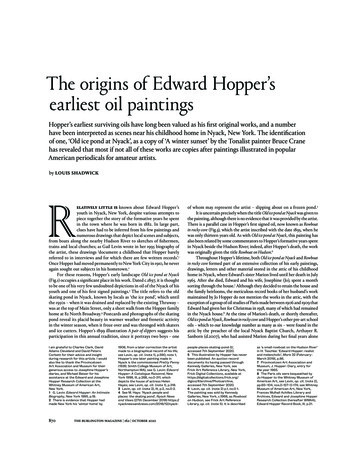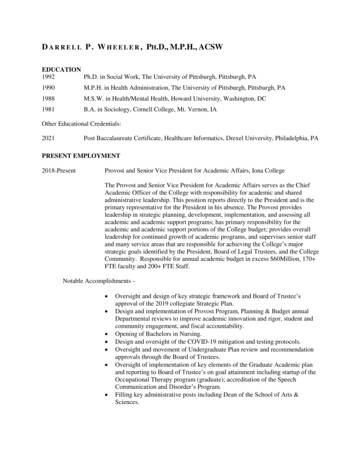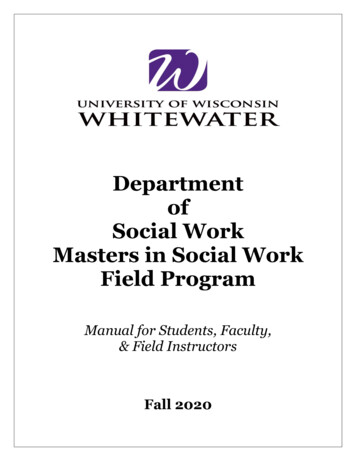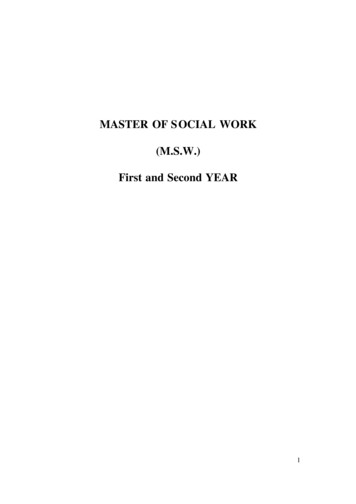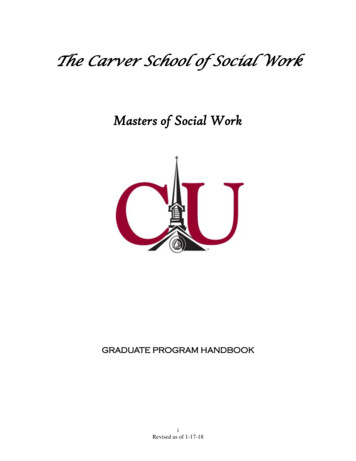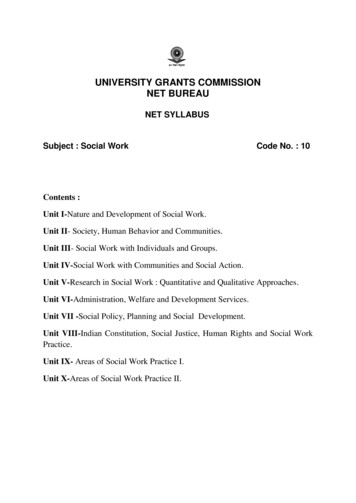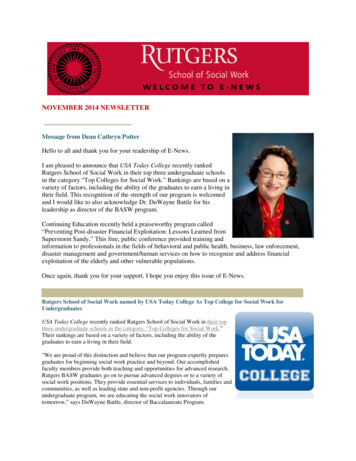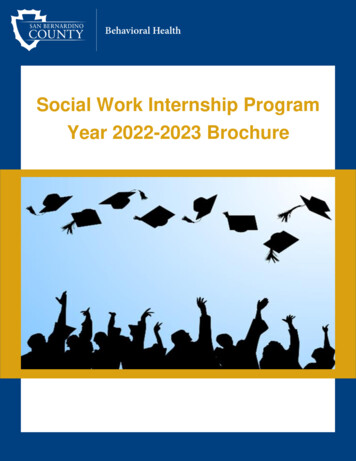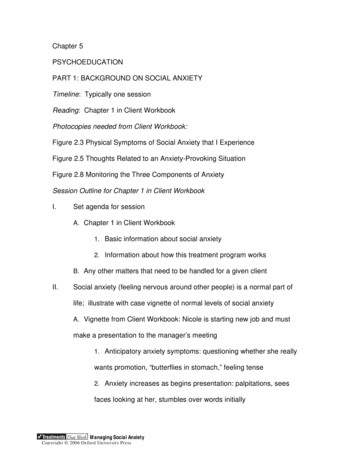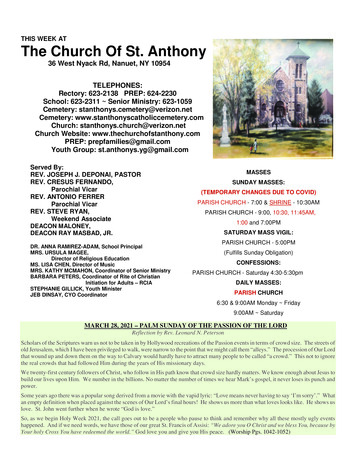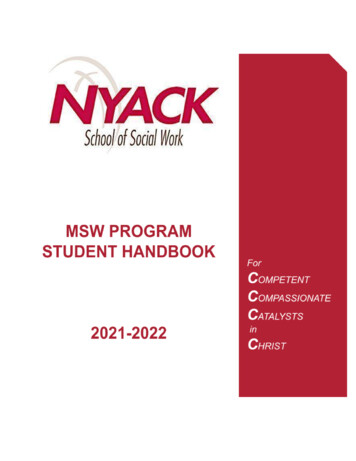
Transcription
1of Social :workMSW PROGRAMSTUD ENT HAINDBOOK1ForCOMPETENTCOMPASSIONATECATALYSTS2021 2022inCHRIST
2SCHOOL OF SOCIAL WORK FACULTY DIRECTORY4WELCOME TO NYACK COLLEGE MSW PROGRAM7SECTION I8I. THE MSW PROGRAM1.1 The Master of Social Work Program Mission Statement1.2 MSW Program Goals1.3 MSW Program–Generalist Level & Specialization Level:1.4 Generalist Level1.4.1 Specialization Practice Level1.4.2 Clinical Social Work Practice Specialization Course Requirements:1.4.3 Leadership in Organizations & Communities Course Requirements:1.5 Field Education1.5.1 Traditional 2-Year Track1.5.2 Advanced Standing Track1.5.3 Experienced and Employed Social Service Practitioners’ (EESSP) Track1.6 MSW Generalist Level Core Curriculum1.7 MSW Specialization Level Curriculum (Clinical & Leadership in Organizationsand Communities)1.8 Social Work Competencies & BehaviorsGeneralist Level Competencies & BehaviorsSpecialization Level: Clinical Social Work (CSW)Specialization Level: Leadership in Organization & Communities (LOC)1.9 Assessment Of Student Outcomes8888991010111112121213131313192632II. ADMISSION TO THE MSW PROGRAM2.1 Admission Criteria2.2 Applicants to the Advanced Standing Program2.3 Admission Assessment2.3.1 Prerequisites for Admission2.3.2 International Students2.3.3 Non-Degree Students2.4 Transfer of Graduate Credits2.4.1 Transfer of Elective Credits2.5 Independent Study2.6 Provisional Admission2.7 Conditional Admission333333343434353535363636III. ACADEMIC POLICIES AND PROCEDURES3.1 Faculty Advising3.2 Faculty Office Hours373737
School of Social Work MSW Student Handbook3.3 Class Attendance3.3.1 Standard Software Requirement3.3.2 Electronic Devices in the Classroom3.3.3 Campus Email Communication3.4 Grading3.4.1 Incompletes3.4.2 Course Progression3.4.3 Time Limitations3.4.4 Life Experience3.5 Drop/Add and Withdrawal3.6 Change of Specialization3.7 Leave of Absence/Program on Hold373738383838393939394040IV. STUDENT SUPPORT4.1 School of Social Work Student Organization4.2 MSW Roundtable4.3 Nyack College Information Commons4.4 Nyack Counseling Services4.4 Accommodations for Disabilities4.5 Council on Social Work Educational Policy and Accreditation Statement4.6 Employment Resources4.7 Alumni4.8 Getting Licensed After Graduation41414141424242424242SECTION II44Students Academic & Professional Standards and Policies & Procedures For Performance Review441. Background1.2 Philosophy of Discipline of Nyack College1.3 Objective1.4 Scope1.5. Student Responsibility To Be Informed44444445462. Academic Standards, Probation and Dismissal2.1 Academic Performance Criteria2.2 Academic Probation and Dismissal2.3 Academic Dismissal Appeal2.4 Academic Misconduct & Dishonesty2.5 Plagiarism – Levels and ConsequencesLevel One: Minimal PlagiarismLevel Two: Substantial Plagiarism46464647474747473. Student Professional Performance Standards48
School of Social Work MSW Student Handbook3.1 Student Ethical and Professional Performance Standards3.1.1 Physical Performance3.1.2 Cognitive Performance3.1.3 Emotional Maturity and Mental Health Performance3.1.4 Communication Performance3.1.5 Interpersonal, Ethical and Behavioral Performances4848484949494. Academic and Professional Performance Review4.1 Evidence of Meeting Academic and Professional Performance Criteria4.2 Policies & Procedures for Academic and Professional Performance Review4.3 Policy on Review, Probation, & Dismissal or Termination4.4 Procedures for Handling Charges of Incompetence or Unethical Behavior4.4.1 The Three (3) Levels of Review4.4.2 Possible Outcome(s) of the Review515152525253555. Grievance Procedures to Resolve Complaints5.1 Informal Grievance Procedures5.2 Formal Grievance Procedures5757576. Readmission to the Program6.1 Students dismissed for academic deficiency6.2 Students dismissed for unethical behavior575758APPENDICES59APPENDIX APlans of StudyClinical Specialization Two Year Plan of StudyFIRST ACADEMIC YEARSECOND ACADEMIC YEARClinical Specialization Three or Four Year Plan of StudyFIRST ACADEMIC YEARSECOND ACADEMIC YEARTHIRD ACADEMIC YEARFOURTH ACADEMIC YEARClinical Specialization Advanced Standing Plan of StudyClinical Specialization Advanced Standing Plan Of Study Over 2 YearsFIRST ACADEMIC YEARSECOND ACADEMIC YEARExperienced and Employed Social Service Practitioners’ (EESSP)Clinical SpecializationFIRST ACADEMIC YEARSECOND ACADEMIC YEARTHIRD ACADEMIC YEAR59596060606161616162636464646565656565
School of Social Work MSW Student HandbookLeadership in Organizations & Communities Practice Specialization:Two Year Plan of StudyFIRST ACADEMIC YEARSECOND ACADEMIC YEARLeadership in Organizations & Communities Practice Specialization:Three or Four Year Plan of StudyFIRST ACADEMIC YEARSECOND ACADEMIC YEARTHIRD ACADEMIC YEARFOURTH ACADEMIC YEARLeadership in Organizations & Communities Specialization: Advanced Standing Plan of StudyLeadership in Organizations & Communities Specialization:Advanced Standing Plan of Study Over 2 YearsFIRST ACADEMIC YEARSECOND ACADEMIC YEAR676767676868686868697071717171APPENDIX BCSWE Educational Policy And Accreditation Standards7272APPENDIX CNASW Code of Ethics - Value Base of the Profession7373APPENDIX DStatement of Confidentiality7676APPENDIX EDuty To Report7777APPENDIX FPersonal Safety Info7878APPENDIX GNyack College School of Social WorkStudent Professional Performance Standards Agreement808080APPENDIX HStudent Professional Performance Improvement Form8383
SCHOOL OF SOCIAL WORK FACULTY DIRECTORYNyack College AdministrationDr. David TurkProvost, V.P. for AcademicAffairs2 Washington Street21st FloorNew York, NY 10004646.378.6100David.Turk@nyack.eduSchool of Social Work Faculty and StaffFull-Time FacultyDr. Kwiryung YunDean & Professor2 Washington Street20th Fl. Rm. 2014New York, NY 10004646.378.6100 ext. 6170Kwi.Yun@nyack.eduDr. Stacey BarkerMSW Program Director &Professor2 Washington Street20th Fl. Rm. 2019New York, NY 10004646.378.6100 ext. 7745Stacey.Barker@nyack.eduDr. DeVonne AllenBSW Program Director &Assistant Professor2 Washington Street20th Fl. Rm. 2017New York, NY 10004646.378.6100Devonne.Allen@nyack.eduDr. Janet FurnessProfessor2 Washington Street20th Fl. Rm. 2017New York, NY 10004646.378.6100 ext: 6169Janet.Furness@nyack.eduDr. Anderson YoonProfessor2 Washington Street20th FloorNew York, NY 10004646.378.6100Anderson.Yoon@nyack.edu4
Dr. Ingyu MoonAssistant Professor2 Washington Street20th Fl. Rm. 2020New York, NY 10004646.378.6100 ext: 7910Ingyu.Moon@nyack.eduProf. Carlton JeanLecturer2 Washington Street20th Fl. Rm. 2020New York, NY 10004646.378.6100 ext. 6120Carlton.Jean@nyack.eduProf. Percelene McLainInterim Field Education Director2 Washington Street20th Fl. Rm. 2022New York, NY 10004646.378.6100 ext: 6165Percelene.Mclain@nyack.eduGriselda AbreuAdjunct LecturerGriselda.Abreu@nyack.eduPatrice BarnesAdjunct LecturerPatrice.Barnes@nyack.eduFred BrandenbergerAdjunct LecturerFrederick.Brandenberger@nyack.eduLatatche FarleyAdjunct LecturerLatatche.Farley@nyack.eduKaren FordAdjunct LecturerKaren.Ford@nyack.eduMarcia HerreraAdjunct LecturerMarcia.Herrera@nyack.eduMark JenningsAdjunct LecturerMark.Jennings@nyack.eduTricia PhilbertAdjunct LecturerTricia.Philbert@nyack.eduSchmika RisherAdjunct LecturerSchmika.Risher@nyack.eduGail-Ann RobertsAdjunct LecturerGail-ann.Roberts@nyack.eduAdministrative Assistant to theDean of Social Work2 Washington Street20th Fl. Rm. 2021New York, NY 10004646.378.6100 ext: 6130Soli.Pyo@nyack.eduPart-Time FacultyStaffSoli Pyo5
Elizabeth BenitezAssistant Field EducationCoordinator2 Washington Street20th Fl. Rm. 2021New York, NY 10004646.378.6100 ext: 7866swfieldeducation@nyack.eduTabreeca WoodsideSocial Work ProgramsAssistant2 Washington Street20th Fl. Rm. 2021New York, NY 10004646.378.6100 ext: 6195MSW.Assist@nyack.eduSamura JonesMSW GraduateAdmissions2 Washington StreetNew York, NY 10004646.378.6100 ext: 6105Samura.Jones@nyack.edu6
WELCOME TO NYACK COLLEGE MSW PROGRAMThis handbook provides a description of official policies and procedures of the Nyack College School of SocialWork, Master of Social Work Program and a description of the curriculum requirements for the MSW degree.Students in the MSW Program are responsible for knowing the program and college policies and procedures,including those presented in the Nyack College Catalog found at www.nyack.eduWe are pleased you have chosen to pursue the Master of Social Work degree (MSW) at the Nyack College Schoolof Social Work. Our MSW Program is dedicated to developing compassionate, competent and ethicalprofessionals who are catalysts making a difference in the lives of people and their communities. Our values ofjustice, compassion, and service are directly derived from Christian teachings and the values of the profession ofsocial work as evident in the NASW Code of Ethics (2017).Whether in the classroom, through scholarship, or in service to the community, the work done in our MSWProgram by our faculty, staff, and students creates a better world through social work. In doing so, we respondto and reflect the Church’s call to love our neighbors and become the extraordinary force that builds compassionand justice in the world. Students who complete the MSW degree are prepared for advanced social workpractice and leadership in public and private agencies that serve the community.Our faculty brings decades of experience as social workers, educators, consultants, and agency administrators tothe program. The faculty and staff are committed to maintaining a quality educational program, to meet the needsof our students, and to providing leadership and service to the social work profession and community. Graduatestudy at Nyack College focuses on high quality, student centered programming and supports collaborativecommunity partnerships.All students are assigned a faculty advisor. Students are encouraged to discuss questions regarding materials inthe handbook with their faculty advisor or with the MSW Program Director.We welcome you to the School of Social Work at Nyack College and to the MSW program. We believe you willfind this a stimulating, challenging, and rewarding experience as together we serve God in the world through thepower of social work!Best Regards,Stacey L. BarkerStacey L. Barker, PhD, MSWDirector, MSW ProgramProfessor of Social Work7
SECTION II.1.1THE MSW PROGRAMThe Master of Social Work Program Mission StatementThe Mission of the Nyack College Master of Social Work Program is to prepare students in a Christian context forthe Social Work profession with the knowledge, values and skill for competent and compassionate service andleadership, with integrity, in order to increase the well-being of all people and promote just and caring communitieslocally, nationally, and globally.1.2MSW Program Goals1. To provide a curriculum that equips students for competent practice with knowledge, values, and skills ofthe social work profession guided by a person-in-environment framework, strengths perspective andevidence based practice, respect for human diversity, and a global perspective.2. To provide a transformational learning environment that models integration of Christian faith with learningthat helps students grow personally, professionally, and spiritually, and promotes their compassion andcommitment to the calling that is consistent with the Christian values of loving God and serving all people.3. To prepare students for service and leadership in public and private sectors including faith-basedorganizations responding to community needs.4. To produce students who are able to identify and think critically about the multiple causes of problems, thenature and dynamics of change, and strategies for bringing about reconciliation and social justice withparticular attention to underserved urban populations.5. To provide a stimulating, challenging, and supportive environment that facilitates students’ commitmentto on-going growth and development.1.3MSW Program–Generalist Level & Specialization Level:The Nyack College School of Social Work’s MSW is a 63-credit degree program. The minimum time required tosecure the degree is two years. There are two exceptions: (1) if a student has a bachelor’s degree in social work(BSW) within the last seven years from a school accredited by the Council of Social Work Education, they mayenter the program as an Advanced Standing student and earn the degree in one year, (2) and if a student hascompleted generalist requirements at another accredited school of social work (a transfer student), they maycomplete the degree in one year. Advanced Standing Students are required to complete a 33-credit degreeprogram.8
1.4Generalist LevelGeneralist courses provide students grounding to understand the whole field of social work. Unless a student hasentered the school in the Advanced Standing program or transferred equivalent courses from a CSWE accreditedMSW program, generalist courses develop skills to perform at the generalist level practice with individuals,families, groups, organizations and communities. To successfully complete the generalist level and move into thespecialization curriculum, students must maintain a B average and have no incompletes. The Plans of Study forboth the generalist and specialization levels are included in Appendix A.The Generalist Level courses include the following:FALL SEMESTERSPRING SEMESTERCourseCodeCourse TitleCr.CourseCodeCourse TitleCr.SWK514HUMAN BEHAVIOR IN THESOCIAL ENVIRONMENT I3SWK554HUMAN BEHAVIOR IN THESOCIAL ENVIRONMENT II3SWK516GENERALIST SOCIAL WORKPRACTICE I WITHINDIVIDUALS AND FAMILIES3SWK556GENERALIST SOCIAL WORKPRACTICE II WITH GROUPS,ORGANIZATIONS, ANDCOMMUNITIES3SWK534FOUNDATIONS OF SOCIALJUSTICE: DIVERSITY, POWER& OPPRESSION3SWK555SOCIAL WELFARE POLICYAND SERVICES3SWK562SOCIAL WORK ANDCHRISTIANITY3SWK558SOCIAL WORK RESEARCHMETHODS3SWK517FIELD INSTRUCTION ANDSEMINAR I3SWK557FIELD INSTRUCTION ANDSEMINAR II3Total Credits15Total Credits151.4.1Specialization Practice LevelIn the specialization practice level, students must select one of the two specializations:1.2.Clinical Social Work PracticeLeadership in Organizations & Communities9
The fieldwork placement reflects, and is part of, the particular specialization selected. The following is a summaryof the Specialization requirements:1.4.2Clinical Social Work Practice Specialization Course Requirements:FALL SEMESTERSPRING SEMESTERCourseCodeCourse TitleCr.CourseCodeCourse TitleCr.SWK616CLINICAL SOCIAL WORKPRACTICE I WITHINDIVIDUALS3SWK656CLINICAL SOCIAL WORKPRACTICE II WITH FAMILIES3SWK658ADVANCED CLINICALASSESSMENT ANDDIAGNOSIS3CLINICAL SOCIAL WORKPRACTICE III WITH GROUPS3SWK626ELECTIVE3SOCIAL PROGRAM ANDPRACTICE EVALUATION3SWK657FIELD INSTRUCTION ANDSEMINAR IV4ELECTIVE3SWK6994PROFESSIONAL SEMINAR II:RESEARCH AND PRACTICE3FIELD INSTRUCTION ANDSEMINAR IIITOTAL CREDITS16PROFESSIONAL SEMINAR I:COMPASSION, SELF-CAREAND SPIRITUALITY1TOTAL CREDITS17SWK628SWK617SWK6491.4.3Leadership in Organizations & Communities Course Requirements:FALL SEMESTERICourse ICourse TitleSPRING SEMESTERICr.1110CourseICourse TitleICr. I
CodeCodeSWK636LEADERSHIP ANDORGANIZATIONAL PRACTICEI3SWK646LEADERSHIP IN COMMUNITYPRACTICE3SWK628SOCIAL WORK PROGRAMAND PRACTICE EVALUATION3ELECTIVE3FIELD INSTRUCTION ANDSEMINAR III4PROFESSIONAL SEMINAR I:SELF-CARE, COMPASSION,AND SPIRITUALITY1TOTAL CREDITS17SWK617SWK6491.5SWK676LEADERSHIP ANDORGANIZATIONAL PRACTICEII: PROGRAM DESIGN ANDPROPOSAL WRITING3ELECTIVE3ELECTIVE3SWK657FIELD INSTRUCTION ANDSEMINAR IV4SWK699PROFESSIONAL SEMINARII:RESEARCH AND PRACTICE3TOTAL CREDITS16Field EducationField Education is commonly described as that part of the curriculum where the integration of theory andpractice occurs. The opportunity for this "integration" or "hands-on" learning to take place occurs when thestudent is assigned to a field instructor in an agency or organization that is affiliated with the Nyack CollegeSchool of Social Work MSW Program. Broadly speaking, the learning is structured through the identification ofa variety of educational objectives. The field instructor translates these educational objectives into learningtasks for the student and provides both instruction and supervision of the learning.In the MSW Program, field placement constitutes the following hours and broad process for each of our fieldprogram options:1.5.1Traditional 2-Year TrackStudents admitted to the Traditional 2-Year Track are required to complete 450 field hours of practice in thegeneralist year and 600 field hours of practice in the specialization year. Non-Advanced Standing students attendField Seminar on campus each semester.11
1.5.2Advanced Standing TrackStudents admitted to the Advanced Standing Track are required to complete 600 field hours of practice.Advanced standing students usually go into field placement during the Fall and Spring of their first year. Thelearning objectives for these field placements are equivalent to the third and fourth terms of the traditional fulltime student. Advanced Standing students attend Field Seminar each semester.1.5.3Experienced and Employed Social Service Practitioners’ (EESSP) TrackThe EESSP Track is designed for students who are already employed in a social service setting for at least sixmonths and are able to complete the required internship hours in their place of employment. The total of 900internship hours is completed during the specialization year, 450 hours each semester, 32 hours per week. Theemployment agency must meet the criteria for employment based internships.There are some variations to this suggested cycle for field placement, which are not mentioned here. It is alwaysbest to check with the field office or with your faculty advisor/field advisor, especially if you are a part timestudent or have questions about the actual timing of your field placement.Upon admission to the School of Social Work MSW Program, the student identifies a skill specialization.The first and second terms of field practicum are spent in core generalist skill preparation. In the third term offield placement, the focus of learning is to develop and practice competencies specific to the student’sspecialization. In the fourth term, the learning objective is to further expand the skill level to mastery of thespecialization competencies specific to the student’s choice of preparation for professional practice.The Field Education Manual is required reading for all students in Field and is distributed at Fieldorientation.Plans of study are found in Appendix A for the following specializations:Clinical Social Work PracticeLeadership in Organizations & CommunitiesAnd for the following time frames:2 year plan of study4 year plan of study (PT)1.6MSW Generalist Level Core CurriculumThe generalist curriculum is designed to provide all incoming master's students with the basic values,knowledge, and skills needed to gain competence in the application of the generalist social work to practice. Anunderstanding of the profession’s values, orientation, history and philosophy, and frames of reference forpractice establishes a basis for students to progress through the specialization curricula of the MSW Program.All MSW students must complete the MSW generalist requirements listed below unless they are exempt via12
Advanced Standing credit or transfer credit (refer to MSW Program Policy on Advanced Standing in section 2.2and transfer credits in section 2.4).1.7MSW Specialization Level Curriculum (Clinical & Leadership in Organizationsand Communities)The Nyack College School of Social Work MSW program understands the need for social workers who areclinically trained and able to practice as administrators, supervisors, community organizers, and compassionateadvocates with diverse populations as well. The specialization level curriculum includes two specializations: (1)Clinical Social Work Practice and (2) Leadership in Organizations & Communities. Each specialization buildsupon knowledge and practice behaviors students develop during the Generalist year. Specialization practice ineach of the specializations incorporates all of the core competencies developed in the Foundation year,augmented by knowledge and practice behaviors specific to a specialization.1.8Social Work Competencies & BehaviorsThe nine CSWE social work competencies are listed below. Each competency describes the knowledge, values,skills, cognitive and affective processes that comprise the competency at the generalist level of practice, followedby a set of behaviors that integrate these components. These behaviors represent observable components of thecompetencies, while the preceding statements represent the underlying content and processes that inform thebehaviors. Nyack College has an additional competency related to its Institutional Program Mission which appearsas Competency 10 in the charts below.Generalist Level Competencies & BehaviorsCompetency 1: Demonstrate Ethical and ProfessionalBehaviorCompetency 1: BehaviorsSocial Workers understand the value base of theprofession and its ethical standards, as well asrelevant laws and regulations that may impactpractice at the micro, mezzo, and macro levels.Social Workers understand frameworks of ethicaldecision-making and how to apply principles ofcritical thinking to those frameworks in practice,research, and policy arenas. Social workersrecognize personal values and the distinctionbetween personal and professional values. Theyalso understand how their personal experiencesand affective reactions influence theirprofessional judgement and behavior. Socialworkers understand the profession’s history, itsmission, and the roles and responsibilities of theprofession. Social workers also understand therole of other professions when engaged in1. Make ethical decisions by applying standardsof the NASW Code of Ethics, relevant lawsand regulations, models for ethicaldecision-making, ethical conduct of research,and additional codes of ethics as appropriate tocontext;2. Use reflection and self-regulation to managepersonal values and maintain professionalismin practice situations;3. Demonstrate professional demeanor inbehavior; appearance; and oral, written, andelectronic communication;4. Use technology ethically and appropriately tofacilitate practice outcomes;13
inter-professional teams. Social workersrecognize the importance of life-long learningand are committed to continually updating theirskills to ensure they are relevant and effective.Social workers also understand emerging formsof technology and the ethical use of technologyin social work practice.5. Use supervision and consultation to guideprofessional judgment and behavior.Competency 2: Engage Diversity and Differencein PracticeCompetency 2: BehaviorsSocial workers understand how diversity anddifference characterize and shape the humanexperience and are critical to the formation ofidentity. The dimensions of diversity areunderstood as the intersectionality of multiplefactors including but not limited to age, class,color, culture, disability and ability, ethnicity,gender, gender identity, and expression,immigration status, marital status, politicalideology, race, religion/spirituality, sex, sexualorientation, and tribal sovereign status.Social workers understand that, as a consequenceof difference, a person’s life experiences mayinclude oppression, poverty, marginalization, andalienation as well as privilege, power, andacclaim. Social workers also understand theforms and mechanisms of oppression anddiscrimination and recognize the extent to whicha culture’s structures and values, including social,economic, political, and cultural exclusions, mayoppress, marginalize, alienate, or create privilegeand power.1. Apply and communicate an understanding ofthe importance of diversity and difference inshaping life experiences in practice at themicro, mezzo, and macro levels.2. Present themselves as learners and engageclients and constituencies as experts of theirown experiences;3. Apply self-awareness and self-regulation tomanage the influence of personal biases andvalues in working with diverse clients andconstituencies.Competency 3: Advance Human Rights and Social,Economic, and Environmental JusticeCompetency 3: BehaviorsSocial workers understand that every personregardless of position in society has fundamentalhuman rights such as freedom, safety, privacy, anadequate standard of living, health care, andeducation. Social workers understand the globalinterconnections of oppression and human rightsviolations, and are knowledgeable about theoriesof human needs and social justice and strategies1. Apply their understanding of social economic,and environmental justice to advocate for humanrights at the individual and system levels; and2. Engage in practices that advance social,economic, and environmental justice.14
to promote social and economic justice andhuman rights. Social workers understandstrategies designed to eliminate oppressivestructural barriers to ensure that social goods,rights, and responsibilities are distributedequitably and that civil, political, environmental,economic, social, and cultural human rights areprotected.Competency 4: Engage in Practice-Informed Researchand Research-Informed PracticeCompetency 4: BehaviorsSocial workers understand quantitative andqualitative research methods and their respectiveroles in advancing a science of social work inevaluating their practice. Social workers knowthe principles of logic, scientific inquiry, andculturally informed and ethical approaches tobuilding knowledge. Social workers understandthat evidence that informs practice derives frommulti-disciplinary sources and multiple ways ofknowing. They also understand the process fortranslating research findings into effectivepractice.1. Use practice experience and theory to informscientific inquiry and research;2. Apply critical thinking to engage in analysisof quantitative and qualitative researchmethods and research finding;3. Use and translate research evidence to informand improve practice, policy, and servicedelivery.15
Competency 5: Engage in Policy PracticeCompetency 5: BehaviorsSocial workers understand that human rights andsocial justice, as well as social welfare andservices, are mediated by policy and itsimplementation at the federal, state, and locallevels. Social workers understand the history andcurrent structures of social policies and services,the role of policy in service delivery, and the roleof practice in policy development. Social workersunderstand their role in policy development andimplementation within their practice settings atthe micro, mezzo, and macro levels and theyactively engage in policy practice to effectchange within those settings. Social workersrecognize and understand the historical, social,cultural, economic, organizational,environmental, and global influences that affectsocial policy. They are also knowledgeable aboutpolicy formulation, analysis, implementation, andevaluation.1. Identify social policy at the local, state, andfederal level that impacts well-being,service delivery, and access to socialservices;2. Assess how social welfare and economicpolicies impact the delivery, and access tosocial services;3. Apply critical thinking to analyze,formulate, and advocate for policies thatadvance human rights and social,economic, and environmental justice.Competency 6: Engage with Individuals, Families,Groups, Organizations, and CommunitiesCompetency 6: BehaviorsSocial workers understand that engagement is anongoing component of the dynamic andinteractive process of social work practice with,and on behalf of, diverse individuals, families,groups, organizations, and communities. Socialworkers value the importance of humanrelationships. Social workers understand theoriesof human behavior and the social environment,and critically evaluate and apply this knowledgeto facilitate engagement with clients andconstituencies, including individuals, families,groups, organizations, and communities. Socialworkers understand strategies to engage diverseclients and constituencies to advance practiceeffectiveness.Social workers understand how their personalexperiences and affective reactions may impacttheir ability to effectively engage with diverse1. Apply knowledge of human behavior andthe social environment,person-in-environment, and othermultidisciplinary theoretical frameworks toengage with clients and constituencies; and2. Use empathy, reflection, and interpersonalskills to effectively engage diverse clientsand constituencies.16
clients and constituencies. Social workers valueprinciples of relationship-building andinter-professional collaboration to facilitateengagement with clients, constituencies, andother professionals as appropriate.Competency 7: Assess Individuals, Families, Groups,Organizations, and CommunitiesCompetency 7: BehaviorsSocial workers understand that assessment is anongoing component of the dynamic andinteractive process of social work practice with,and on behalf of, diverse individuals, families,groups, organizations, and communities. Socialworkers understand theories of human behaviorand the social environment, and criticallyevaluate and apply this knowledge in theassessment of diverse clients and constituencies,including individuals, families, groups,organizations, and communities.Social workers understand methods ofassessment with diverse clients andconstituencies to advance practice effectiveness.Social workers recognize the implications of thelarger practice context in the assessment processand value the importance of interprofessionalcollaboration in this process. Social workersunderstand how their personal experiences andaffective reactions may affect their assessmentand decision-making.1. Collect and organize data, and applycritical thinking to interpret informationfrom clients and constituencies;2. Apply knowledge of human behavior andthe social environment,person-in-environment, and ot
WELCOME TO NYACK COLLEGE MSW PROGRAM 7 SECTION I 8 I. THE MSW PROGRAM 8 1.1The Master of Social Work Program Mission Statement 8 1.2 MSW Program Goals 8 1.3 MSW Program-GeneralistLevel & Specialization Level: 8 1.4 Generalist Level 9 1.4.1 SpecializationPractice Level 9
